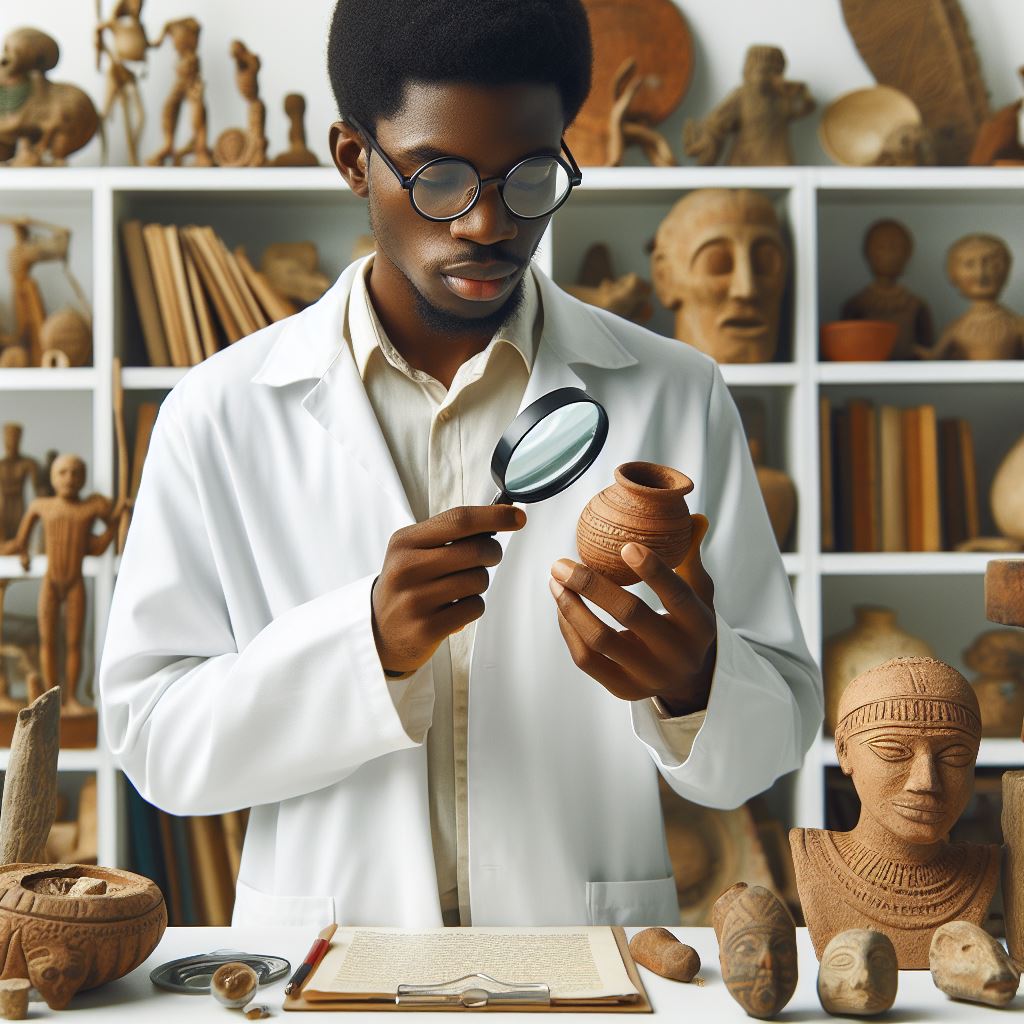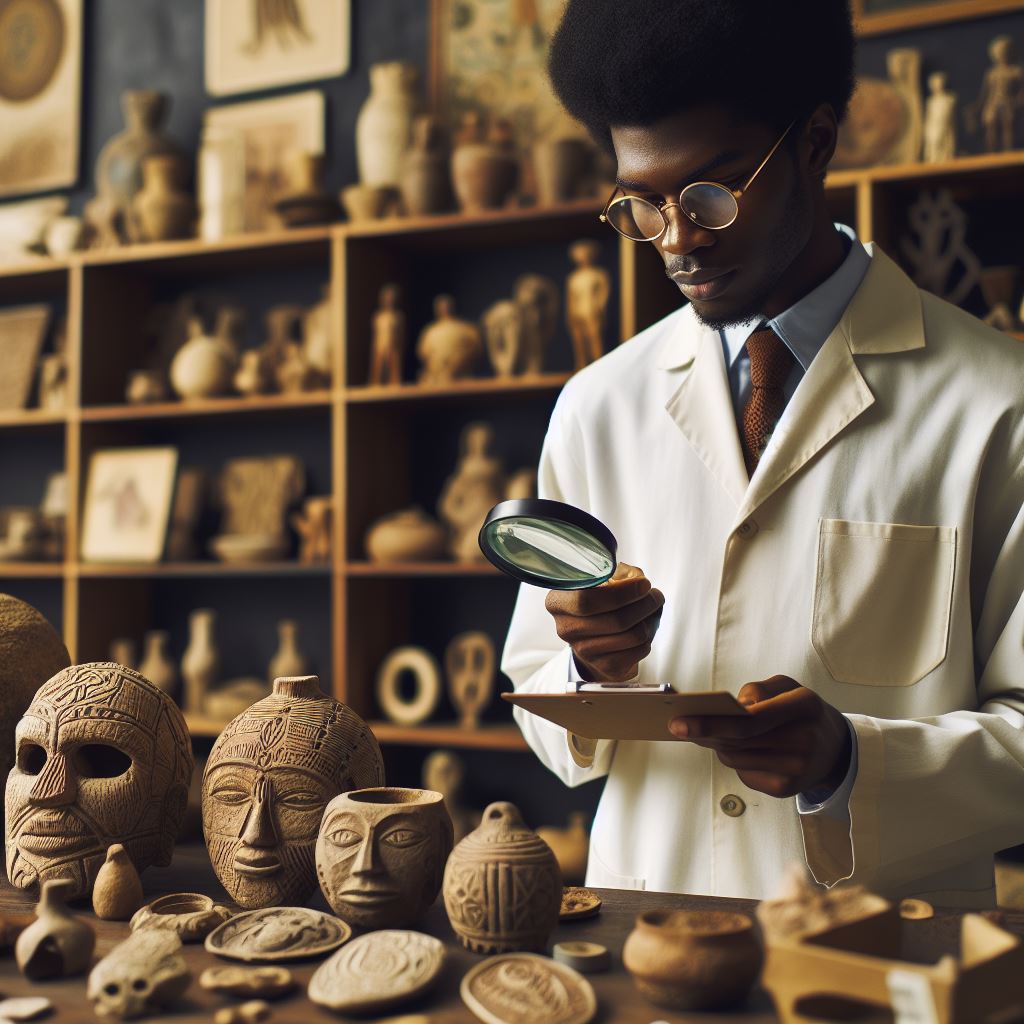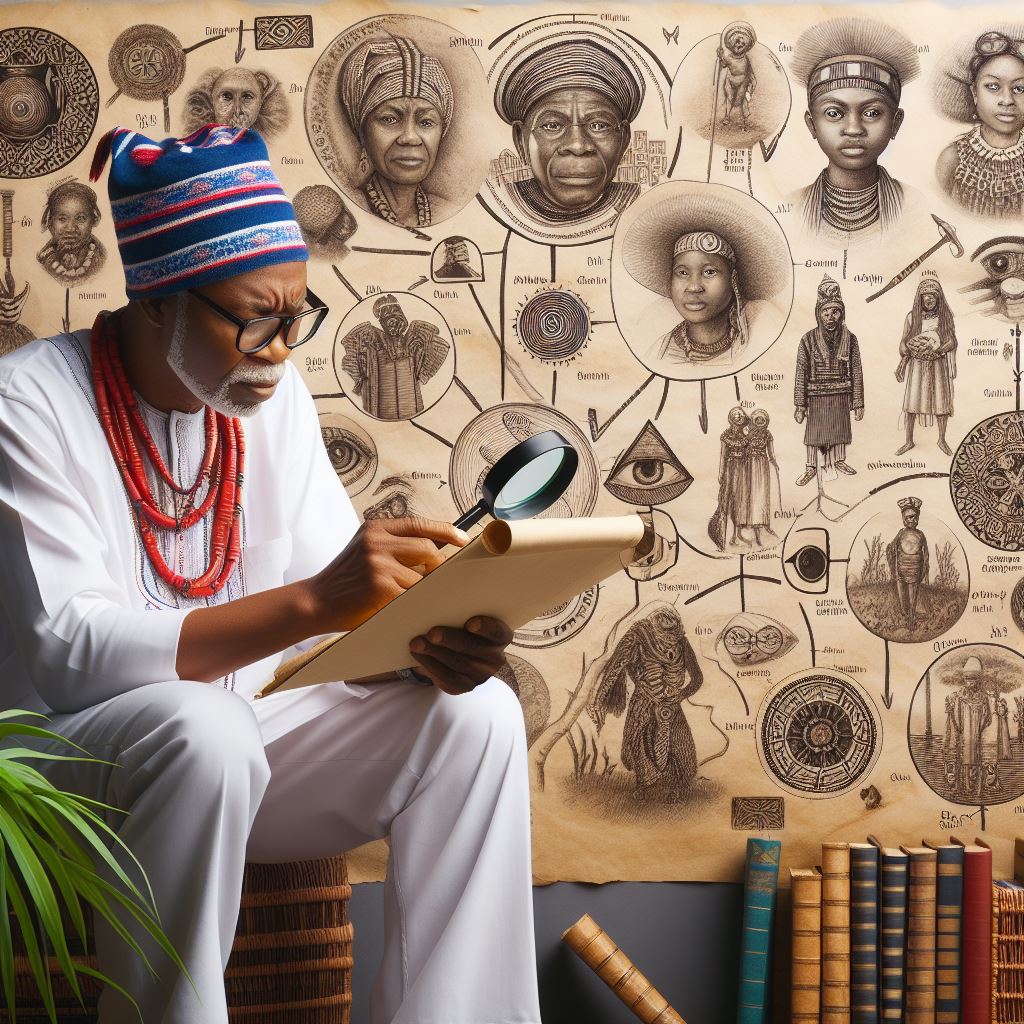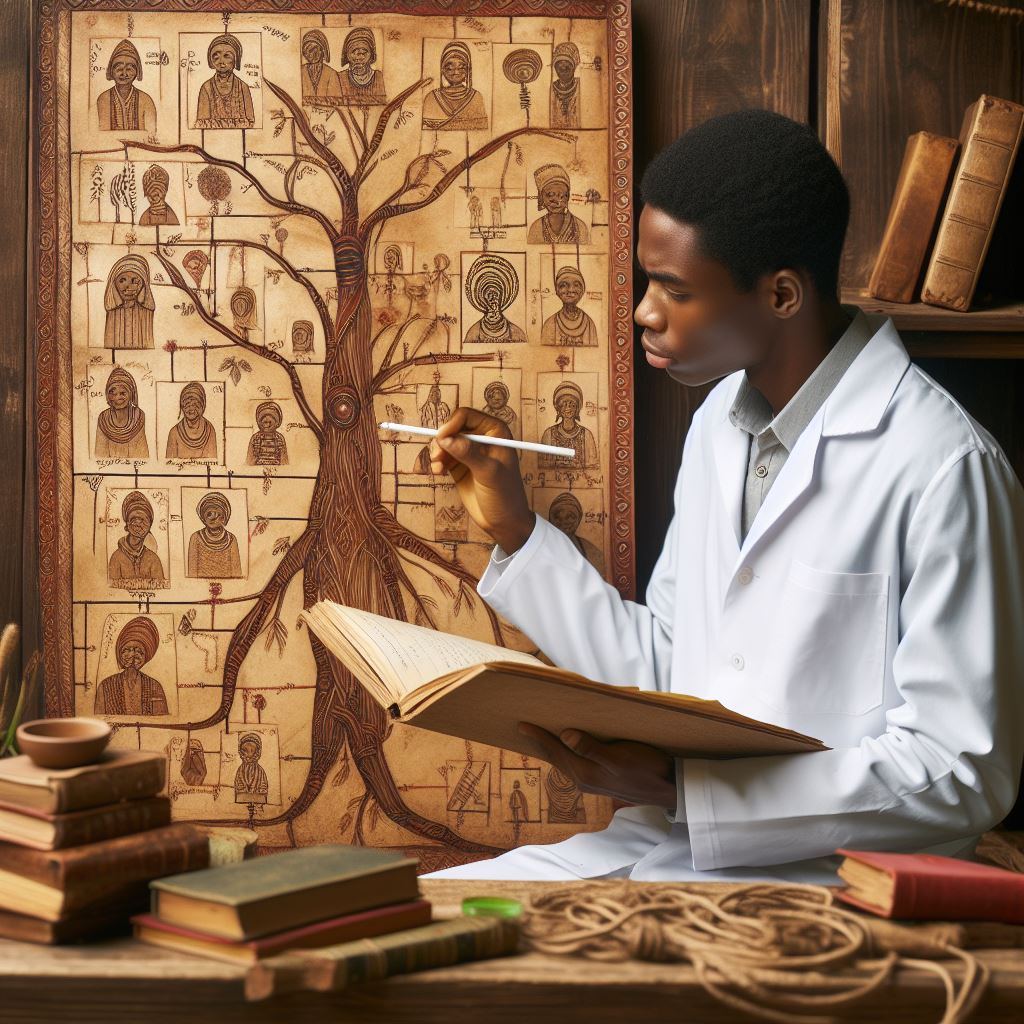Introduction
Nigeria’s rich archaeological heritage offers invaluable insights into the ancient societies that once thrived in the region. To uncover and understand these past civilizations, anthropology plays a pivotal role.
By examining cultural artifacts and human remains, anthropologists help us piece together the story of Nigeria’s diverse and complex history.
The Role of Anthropology in Nigerian Archaeological Discoveries
Anthropology, the study of humans and their societies, is essential in archaeological research. In Nigeria, this field has been instrumental in uncovering and interpreting archaeological finds.
Anthropologists study artifacts, structures, and remains to reconstruct the lifestyles, beliefs, and social structures of ancient Nigerian communities.
Understanding Cultural Artifacts
Cultural artifacts are tangible evidence of past human activity. In Nigeria, artifacts such as pottery, tools, and ornaments reveal much about ancient societies.
Anthropologists analyze these objects to determine their function and significance. For example, pottery styles and materials can indicate trade networks and technological advancements.
Examining Human Remains
Human remains offer a direct link to the people of the past. In Nigeria, anthropologists study skeletal remains to understand health, diet, and mortality rates of ancient populations.
Through this analysis, they can infer social hierarchies, migration patterns, and even familial relationships within communities.
Reconstructing Ancient Societies
Anthropologists combine data from artifacts and human remains to reconstruct ancient societies. In Nigeria, this approach has shed light on various cultures, such as the Nok and the Yoruba.
By studying settlement patterns and burial practices, anthropologists reveal how these societies organized themselves and interacted with their environment.
The Crucial Role of Anthropology in Understanding Nigeria’s Past
Anthropology is crucial for several reasons. It provides context to archaeological finds, offering a narrative that mere artifacts cannot tell. This context helps us appreciate the complexity and richness of Nigeria’s cultural heritage.
Providing Cultural Context
Anthropologists provide cultural context to archaeological discoveries. They interpret artifacts and remains within the framework of cultural practices and beliefs.
This contextualization is essential for understanding the significance of discoveries. For instance, the intricate bronze sculptures of Ife gain deeper meaning when viewed through the lens of Yoruba cosmology and artistry.
Enhancing Historical Knowledge
Anthropology enhances our historical knowledge by filling gaps left by other disciplines. In Nigeria, where written records are scarce for ancient periods, anthropological research is invaluable.
It allows us to construct a more comprehensive and nuanced history of the region.
Promoting Cultural Preservation
Anthropology also plays a role in cultural preservation. By documenting and studying Nigeria’s archaeological heritage, anthropologists help preserve it for future generations.
Their work raises awareness about the importance of protecting archaeological sites from destruction or neglect.
Informing Modern Identity
Understanding the past through anthropology informs modern Nigerian identity. It fosters a sense of pride and continuity, linking present-day Nigerians to their ancestors.
This connection strengthens cultural identity and promotes national unity.
Anthropology is indispensable in the field of Nigerian archaeology. It uncovers the stories behind artifacts and remains, providing a richer understanding of the past.
Through its insights, we gain a deeper appreciation of Nigeria’s diverse and vibrant heritage.
By continuing to support and develop anthropological research, we ensure that the legacy of Nigeria’s ancient societies is preserved and celebrated.
Anthropology in Nigerian Archaeological Discoveries
In Nigerian archaeological discoveries, anthropology plays a crucial role in providing a comprehensive understanding of ancient Nigerian societies.
Anthropologists utilize their expertise in studying human cultures, societies, and behavior to shed light on the people who lived in Nigeria centuries ago.
Understanding Ancient Nigerian Societies
Anthropology helps archaeologists decipher the social structure, belief systems, and daily lives of ancient Nigerian communities.
By analyzing artifacts, burial practices, and settlement patterns, anthropologists can reconstruct the cultural practices and traditions of these societies.
This information provides valuable insights into the way people lived, interacted, and organized themselves in the past.
Interpreting Artifacts and Sites
Anthropological methods such as ethnographic studies, ethnobotany, and ethnoarchaeology are instrumental in interpreting artifacts and archaeological sites in Nigeria.
Ethnographic studies involve observing and interacting with contemporary communities to understand their customs and practices, which can be correlated with archaeological findings.
Ethnobotany helps identify plant remains in archaeological sites, providing clues about ancient diets, medicinal practices, and environmental adaptations.
Ethnoarchaeology studies the behavior of modern communities to infer how past societies may have utilized tools, constructed dwellings, or engaged in trade.
- Anthropology provides a multidisciplinary approach to studying Nigerian archaeology.
- Anthropologists collaborate with archaeologists to contextualize artifacts within cultural frameworks.
- By analyzing language, kinship systems, and material culture, anthropologists help interpret the significance of archaeological discoveries.
- Anthropology helps archaeologists understand the symbolic meanings behind artifacts and rituals in Nigerian societies.
- Anthropological research in Nigeria contributes to a holistic understanding of the country’s diverse cultural heritage.
In general, anthropology plays a vital role in Nigerian archaeological discoveries by providing insights into ancient societies and helping archaeologists interpret artifacts and sites.
The collaboration between anthropology and archaeology leads to a more nuanced understanding of Nigeria’s rich cultural past.
Read: Introduction to African and Asian Studies in Nigeria
Cultural Context
Understanding Cultural Context
Anthropology plays a crucial role in Nigerian archaeological discoveries. It helps uncover the cultural context of ancient artifacts. By understanding cultural context, researchers gain insights into the lives of past Nigerian societies.
Anthropology bridges the gap between the physical remnants and the people who created them.
Unveiling Traditions Through Artifacts
Artifacts found in Nigeria reveal much about historical traditions. Anthropologists analyze these items to understand their significance.
Pottery, tools, and sculptures all tell a story about the people who used them. By studying these objects, anthropologists can infer social structures and daily routines. This information helps reconstruct the lifestyles of ancient Nigerian communities.
Deciphering Beliefs and Practices
Anthropology also aids in deciphering the beliefs and practices of past societies. Ritual objects, burial sites, and religious artifacts provide clues about spiritual life.
These items reflect the values and beliefs of the people who used them. Anthropologists study these artifacts to understand religious practices and societal norms.
The Importance of Oral Traditions
Oral traditions are vital in understanding the cultural context of archaeological findings. Nigerian societies have rich oral histories passed down through generations.
Anthropologists record and analyze these stories to gain insights into historical events and cultural practices. Oral traditions complement physical evidence, providing a fuller picture of the past.
Interpreting Social Structures
Anthropological studies help interpret the social structures of ancient Nigerian societies. Researchers examine artifacts within their cultural context to understand social hierarchies and community organization.
By analyzing the distribution and variety of artifacts, anthropologists can identify class distinctions and roles within society.
Linking Past and Present
Anthropology connects past Nigerian societies with contemporary communities. By studying historical artifacts and practices, anthropologists help preserve cultural heritage.
This connection enriches modern Nigerian identity and promotes cultural continuity. Understanding the past informs present practices and future developments.
Case Study: Nok Culture
The Nok culture, one of Nigeria’s most significant archaeological discoveries, illustrates the role of anthropology. Anthropologists study Nok terracotta sculptures to understand the society’s artistic traditions and social structure.
These sculptures provide valuable insights into the Nok people’s beliefs, practices, and way of life.
Interdisciplinary Collaboration
Anthropology often collaborates with other disciplines to uncover cultural contexts. Archaeologists, historians, and linguists work together to piece together historical narratives.
This interdisciplinary approach enriches the understanding of Nigerian archaeological findings. Combining different perspectives ensures a comprehensive analysis of cultural contexts.
In a nutshell, Anthropology is essential in uncovering the cultural context of Nigerian archaeological discoveries. It helps interpret artifacts, traditions, beliefs, and social structures.
By understanding these elements, researchers gain a deeper appreciation of Nigeria’s rich cultural heritage.
This knowledge preserves the past and informs the future, highlighting the importance of anthropology in archaeological research.
Read: Famous Nigerian Alumni of Communication Arts Programs

Collaboration with Local Communities
In Nigerian archaeological research, collaboration with local communities plays a pivotal role. Anthropologists and archaeologists recognize the immense value local communities bring to their work.
This collaboration enriches the research and ensures cultural heritage preservation.
Significance of Collaborating with Local Communities
Engaging local communities in archaeological research in Nigeria is crucial. These communities possess invaluable traditional knowledge and historical insights.
Anthropologists understand that locals can provide context that textbooks and artifacts cannot offer. This engagement fosters mutual respect and understanding.
Local communities offer firsthand accounts of traditions and cultural practices. These narratives often remain undocumented but are vital for comprehensive archaeological research.
Their involvement ensures that findings are accurately interpreted within the cultural framework.
Moreover, collaboration with local communities promotes inclusivity in archaeological research. It transforms the process from a top-down approach to a more participatory one.
This inclusiveness enhances the authenticity and credibility of archaeological findings.
Enhancing Cultural Heritage Preservation
Collaborating with local communities helps preserve Nigeria’s rich cultural heritage. Anthropologists work with locals to document traditions, rituals, and oral histories.
This documentation is crucial in preserving intangible cultural heritage that might otherwise be lost.
Local knowledge aids in identifying significant sites and artifacts that might go unnoticed. Community members can pinpoint locations of historical and cultural importance.
This insight is essential for archaeologists aiming to uncover and protect these sites.
Involving local communities also instills a sense of ownership and pride in cultural heritage.
When communities see their history and traditions valued, they become active participants in preservation efforts. This active participation is critical for sustainable heritage conservation.
Preserving Traditional Knowledge
Traditional knowledge is a cornerstone of Nigerian cultural identity.
Collaborating with local communities ensures that this knowledge is respected and preserved. Anthropologists often learn about traditional practices directly from community members.
These collaborations help record traditional agricultural practices, medicinal knowledge, and craftsmanship.
This preservation is not only academic but also practical. It ensures that future generations can access and benefit from this knowledge.
Moreover, documenting traditional knowledge aids in its integration with modern scientific approaches.
This blend of old and new fosters innovative solutions to contemporary challenges. It also promotes a deeper appreciation for traditional wisdom in a modern context.
Building Trust and Empowering Communities
Collaboration fosters trust between anthropologists and local communities.
This trust is crucial for successful research and preservation efforts. When communities trust researchers, they are more likely to share valuable information openly.
Empowering local communities through collaboration also has long-term benefits. It enhances their capacity to manage and protect their cultural heritage independently.
This empowerment ensures the sustainability of preservation efforts long after the researchers have left.
Anthropologists often conduct workshops and training sessions for community members.
These sessions build local capacity in archaeological methods and heritage management. This knowledge transfer is vital for ongoing preservation and research activities.
In essence, The collaboration between anthropologists and local communities is indispensable in Nigerian archaeological research.
It enriches the research, preserves cultural heritage, and ensures the sustainability of preservation efforts. This partnership fosters mutual respect and empowers communities, making them active stewards of their cultural heritage.
Through these collaborative efforts, Nigeria’s rich cultural legacy is preserved for future generations.
Transform Your Career with Expert Guidance
Get personalized mentorship consulting that’s tailored to your unique path. Our expert advice is actionable and exclusive.
Get StartedRead: Communication Arts: Job Prospects and Salaries
Preservation of Heritage
Preserving Nigeria’s rich cultural heritage demands meticulous care and strategic planning.
Archaeological sites, repositories of invaluable historical data, are vulnerable to various threats. Anthropology emerges as a vital player in safeguarding these treasures for future generations.
Anthropology’s Role in Preservation
Anthropologists engage in extensive fieldwork to document and analyze archaeological sites and artifacts.
Through their interdisciplinary approach, they unravel layers of history embedded within Nigeria’s cultural landscape.
By employing advanced techniques, such as remote sensing and GIS mapping, anthropologists create comprehensive inventories of archaeological sites, aiding in their protection.
Active involvement in community outreach programs fosters local stewardship of cultural heritage. Anthropologists collaborate with indigenous communities to raise awareness about the significance of preserving archaeological sites and artifacts.
By involving local stakeholders in conservation efforts, anthropologists ensure sustainable management practices that respect cultural traditions and values.
Moreover, anthropologists conduct research to understand the socio-economic factors influencing the conservation of archaeological sites.
By examining how political instability, urbanization, and economic development impact heritage preservation, they develop strategies to mitigate potential threats.
Through their insights, anthropologists advocate for policies that prioritize the protection of Nigeria’s cultural heritage.
Ethical Considerations in Heritage Conservation
Ethical dilemmas abound in the study and protection of Nigeria’s cultural heritage. Anthropologists grapple with issues surrounding ownership, repatriation, and cultural appropriation.
The repatriation of looted artifacts raises questions about restitution and restitution. Anthropologists advocate for the return of stolen cultural property to their countries of origin, facilitating reconciliation and healing.
Furthermore, anthropologists confront challenges related to the commercialization of archaeological sites and artifacts. The illicit trade in cultural heritage fuels looting and vandalism, jeopardizing the integrity of Nigeria’s archaeological record.
Anthropologists collaborate with law enforcement agencies and international organizations to combat trafficking networks and enforce stringent regulations.
In addition, anthropologists address the ethical implications of conducting research on human remains and sacred sites.
They engage in dialogue with descendant communities to ensure respectful treatment of ancestral remains and adhere to ethical guidelines established by professional associations.
By prioritizing cultural sensitivity and consent, anthropologists foster trust and collaboration with local communities.
In fact, anthropology plays a pivotal role in preserving Nigeria’s cultural heritage.
By documenting, researching, and advocating for the protection of archaeological sites and artifacts, anthropologists contribute to the safeguarding of invaluable cultural treasures.
Ethical considerations guide their actions, ensuring that heritage conservation efforts uphold the rights and dignity of all stakeholders.
Through collaboration and dialogue, anthropology continues to shape the sustainable management of Nigeria’s rich archaeological heritage.
Read: How to Apply for Communication Arts Programs
Impact on Society
Anthropological discoveries in Nigeria transcend mere archaeological findings; they serve as pillars of national identity and pride, resonating deeply within the collective consciousness of its people.
Through meticulous research and excavation, anthropologists unravel the rich tapestry of Nigeria’s past, connecting the dots between ancient civilizations and contemporary society.
Shaping National Identity and Pride
Nigeria’s archaeological treasures speak volumes about its diverse cultural heritage, reinforcing a sense of belonging and pride among its citizens.
From the ancient city of Benin to the Nok terracotta sculptures, each discovery adds a layer to Nigeria’s national narrative, fostering a deeper appreciation for its rich history.
These archaeological findings not only showcase Nigeria’s cultural richness but also challenge preconceived notions about its past.
By highlighting the sophistication of ancient Nigerian civilizations, anthropology helps counter stereotypes and misconceptions, empowering Nigerians to reclaim and celebrate their heritage.
Promoting Cultural Awareness and Policy Reform
Anthropological research goes beyond academic curiosity; it has the power to inform policies and promote cultural awareness in society.
By shedding light on the interconnectedness of past and present, anthropology provides valuable insights for policymakers seeking to preserve Nigeria’s cultural heritage and promote sustainable development.
Moreover, anthropological findings serve as catalysts for cultural revitalization and preservation efforts.
By understanding the practices and beliefs of ancient Nigerian societies, policymakers can design initiatives that safeguard cultural traditions while fostering socio-economic progress.
Bridging Past and Present
Anthropology acts as a bridge between past and present, connecting contemporary Nigerians with their ancestors’ legacy.
By studying artifacts, burial sites, and ancient settlements, anthropologists reconstruct the narratives of bygone eras, allowing modern Nigerians to see themselves as inheritors of a rich cultural tapestry.
This connection to the past fosters a sense of continuity and resilience, reminding Nigerians of their ancestors’ ingenuity and resilience in the face of adversity.
It instills a sense of pride in cultural heritage, encouraging Nigerians to embrace their identity and contribute to its preservation.
Conclusion: Embracing Nigeria’s Cultural Legacy
In review, anthropology plays a pivotal role in shaping Nigeria’s national identity, fostering pride in its rich cultural heritage, and informing policies that promote cultural awareness and preservation.
Through archaeological discoveries and research, anthropology empowers Nigerians to embrace their past, celebrate their diversity, and build a future grounded in respect for cultural heritage.
As Nigeria continues to evolve, anthropology remains a guiding light, illuminating the path towards a more culturally vibrant and inclusive society.
Conclusion
In this chapter, we explored the crucial role anthropology plays in Nigerian archaeological discoveries.
Key Points Discussed
Anthropology provides a comprehensive framework for interpreting archaeological findings.
It incorporates cultural, social, and biological aspects to understand past societies.
Anthropological research methods, such as ethnography, offer insights into contemporary cultures.
These insights can be applied to interpreting ancient societies and their artifacts.
Anthropologists collaborate with archaeologists to ensure a holistic understanding of archaeological sites.
Their expertise in cultural context helps decipher the significance of artifacts.
Anthropology contributes to preserving Nigeria’s cultural heritage by documenting indigenous practices.
This documentation aids in cultural revitalization efforts and community engagement.
Through anthropology, Nigeria’s diverse cultural history is given voice and recognition.
Understanding the cultural context of archaeological sites is essential for their preservation.
Anthropologists advocate for the protection of cultural landscapes and heritage sites.
Their interdisciplinary approach fosters dialogue between scholars, local communities, and policymakers.
Importance of Anthropology
Anthropology serves as a bridge between past and present, linking archaeological discoveries to contemporary cultures.
Preserving Nigeria’s cultural heritage is crucial for maintaining national identity and fostering pride.
Anthropology offers insights into the dynamics of cultural change over time.
Understanding Nigeria’s history through anthropology promotes social cohesion and tolerance.
By studying past societies, anthropology helps address contemporary social challenges.
Anthropological research informs sustainable development initiatives that respect cultural diversity.
Basically, anthropology is instrumental in unraveling Nigeria’s archaeological mysteries.
It enriches our understanding of the past while contributing to the preservation of cultural heritage.
Embracing anthropology ensures that Nigeria’s rich tapestry of cultures continues to inspire future generations.
In closing, As archaeological research in Nigeria continues to evolve, anthropology will remain at its forefront.
Collaboration between anthropologists, archaeologists, and local communities will drive future discoveries.
Through ongoing research and engagement, anthropology will continue to illuminate Nigeria’s vibrant cultural landscape.
In the pursuit of knowledge and understanding, anthropology will play a pivotal role in shaping Nigeria’s future.
By embracing anthropology, we honor Nigeria’s past and safeguard its cultural legacy for generations to come.




